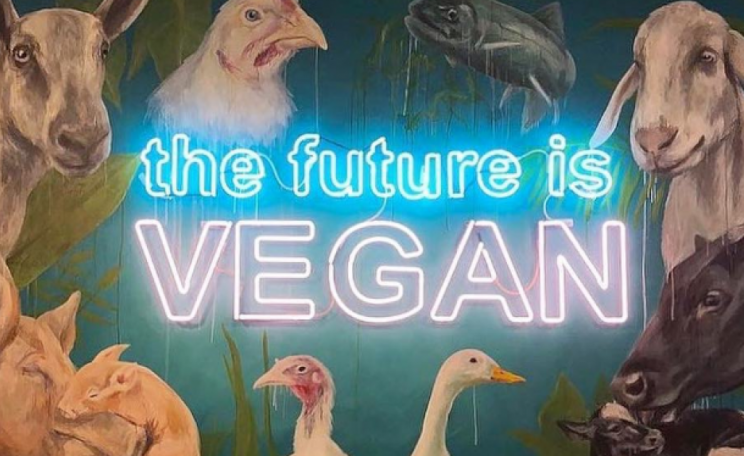As usual, the truth lies somewhere between these two extremes.
A great deal has changed in the UK over the last 75 years. Technology has progressed exponentially; social attitudes have changed and whole industries have come and gone. Diets have also shifted markedly in this time.
The World War II and immediate post-war era were defined by food rationing until this was lifted in 1954. Over the following decades there was a huge increase in animal product consumption.
Today, we are seeing a startling rise in the consumption of plant-based food and people shunning animal products altogether and identifying as vegan.
Variety
The number of vegans in the UK quadrupled between 2014 and 2019 and many people who still eat animal products are now choosing more plant-based foods for health and environmental reasons.
Claims around the healthiness of vegan diets provoke mixed reactions. For some, vegan diets are considered to be inherently unhealthy and are put off veganism because of this.
But for others, veganism is thought to be automatically healthy and is their primary motivation for going vegan or at least eating a fully plant-based diet.
Recent Netflix documentary, The Game Changers, shows a whole host of elite athletes who swear that a plant-based diet gives them the edge they need to succeed.
As usual, the truth lies somewhere between these two extremes. Veganism can be a really healthy choice. As with any diet, you should eat a wide variety of foods to ensure you are getting everything you need to truly thrive.
Ethical
A vegan diet consisting purely of chips and Oreos is not going to be healthy, in the same way that living off cheeseburgers and milkshakes isn’t either.
People have been celebrating World Vegan Day this month, which also marked 75 years since The Vegan Society was founded by Donald Watson. World Vegan Day offers a chance for reflection on just how far veganism has come in three quarters of a century.
To celebrate our 75th anniversary, The Vegan Society has launched a new campaign: ‘Vegan and Thriving’. We want to ensure that people know that you can be healthy and thrive on a vegan diet – despite popular misconceptions around vegan nutrition.
A recent survey revealed that 52 percent of people had health concerns about going vegan and there have been some inaccurate media scare stories of late also.
The British Dietetic Association (BDA) is the body that registers dietitians in the UK – a trusted organisation made up of experts on all things diet related. Dietitians are the only nutrition professionals that are statutorily regulated and governed by an ethical code to ensure they always work to the highest standard.
As usual, the truth lies somewhere between these two extremes.
Misconceptions
The BDA have confirmed several times that a ‘well-planned vegan diet can support healthy living in people of all ages.’ This includes young infants, children, adults and those pregnant and breastfeeding.
The NHS agrees that: “With good planning and an understanding of what makes up a healthy, balanced vegan diet, you can get all the nutrients your body needs.” This shows that the common fear that a vegan diet cannot be healthy is unfounded.
Still the most common question vegans get asked is, “where do you get your protein from?”
This question stems from the idea that protein is only available from animal sourced foods. If protein were only available from other animals, where do all those large herbivores like rhinoceros, elephants and gorillas, get their protein from? Plants of course.
All plants have some degree of protein in them and there are many plant foods that are really high in protein, such as beans, peas, lentils, and some nuts and seeds. But despite this, popularly held misconceptions can be hard to shift.
Thrive
Veganism being a healthy choice links to the recent news story that healthier food choices almost always benefit the environment.
The most sophisticated research on this topic yet, completed by Oxford University, showed that poor diet not only threatens people’s health but also causes environmental damage, whilst healthier options had much less impact on the planet.
Fruits, vegetables, beans and whole grains are examples of foods that were healthy for both people and the planet. Red and processed meat causes the most ill health and pollution, but it is noted that the biggest environmental gains were from replacing any meat with plant-based foods.
Time is running out for us to make the environmental changes we need in order to avert catastrophic runaway climate change. Similarly, diet-related non-communicable diseases like type-2 diabetes, heart disease, high blood pressure, and certain types of cancer, are increasing, with treatment costs in the billions of pounds annually.
The environmental benefits of vegan diets are well documented but less well known is the fact that all of these non-communicable illnesses are less commonly found amongst vegans. Clearly veganism and plant-based diets have an important role to play in tackling these huge global problems we are facing.
We hope that no one is put off veganism for health reasons. You can not only be healthy and vegan you can truly thrive, which will help our planet to thrive as well.
This Author
Mark Banahan is campaigns manager at The Vegan Society. If you would like to find out more about veganism, vegan nutrition and our new campaign Vegan and Thriving, please check out our website here. @MarkBanahan







